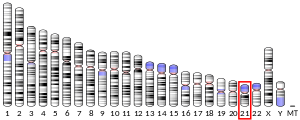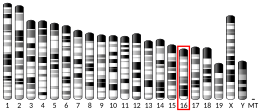La serina proteasa transmembrana 2, o TMPRSS2 (de l'acrònim en anglès Transmembrane protease serine 2), és un enzim codificat en els humans per un gen del mateix nom i que es troba en el cromosoma 21.[5][6]
El gen codifica una proteïna que pertany a la família de les proteases serina. La proteïna conté un domini transmembrana de tipus II, un domini receptor de classe A, un domini receptor scavenger ric en cisteïnes i un domini proteasa. Se sap que les proteases serina es troben implicades en molts processos patològics i fisiològics. Es demostrà que el gen era regulat positivament per hormones androgèniques en les cèl·lules de càncer de la pròstata i regulat negativament en teixit cancerós de pròstata independent d'andrògens. El domini proteasa de la proteïna es pensa que és tallat i segregat en el medi cel·lular mitjançant l'acció de la mateixa proteïna sobre si mateixa. La funció biològica d'aquest gen encara és desconeguda.[6]
La funció de la proteïna TMPRSS2 en la carcinogènesi prostàtica depèn de la sobre-expressió dels factors de transcripció ETS, com ara ERG i ETV1, a través de la fusió gènica. La fusió dels gens TMPRSS2 i ERG és la més freqüent, entre un 40% i un 80%, dels càncers de pròstata humans. La sobre-expressió d'ERG contribueix al desenvolupament de la independència als andrògens en el càncer pròstata a través de la disrupció de la senyalització del receptor d'andrògens.[7]
Alguns coronavirus, com p. ex. el SARS-CoV o el SARS-CoV-2, s'activen per TMPRSS2 i, per tant, poden ser inhibits amb inhibidors de TMPRSS2. El SARS-CoV-2 utilitza el seu receptor humà ACE2 per a l'entrada a la cèl·lula hoste i la proteasa serina TMPRSS2 per al processament de la proteïna S viral en el seu interior.[8] Un inhibidor de la TMPRSS2 aprovat per a ús clínic en blocava l'entrada i podria constituir una opció de tractament.[9]
- ↑ 1,0 1,1 1,2 GRCh38: Ensembl release 89: ENSG00000184012 - Ensembl, May 2017
- ↑ 2,0 2,1 2,2 GRCm38: Ensembl release 89: ENSMUSG00000000385 – Ensembl, May 2017
- ↑ «Human PubMed Reference:». National Center for Biotechnology Information, U.S. National Library of Medicine.
- ↑ «Mouse PubMed Reference:». National Center for Biotechnology Information, U.S. National Library of Medicine.
- ↑ Genomics, 44, 3, 9-1997, pàg. 309–20. DOI: 10.1006/geno.1997.4845. PMID: 9325052.
- ↑ 6,0 6,1 «Entrez Gene: TMPRSS2 transmembrane protease, serine 2».
- ↑ Cancer Cell, 17, 5, 5-2010, pàg. 443–54. DOI: 10.1016/j.ccr.2010.03.018. PMC: 2874722. PMID: 20478527.
- ↑ Molecules, 25, 10, 5-2020, pàg. 2271. DOI: 10.3390/molecules25102271. PMC: 7287752. PMID: 32408547.
- ↑ Cell, 181, 2, 3-2020, pàg. 271–280.e8. DOI: 10.1016/j.cell.2020.02.052. PMC: 7102627. PMID: 32142651 [Consulta: free].
- «Oligo-capping: a simple method to replace the cap structure of eukaryotic mRNAs with oligoribonucleotides». Gene, 138, 1–2, 1-1994, pàg. 171–4. DOI: 10.1016/0378-1119(94)90802-8. PMID: 8125298.
- «Construction and characterization of a full length-enriched and a 5'-end-enriched cDNA library». Gene, 200, 1–2, 10-1997, pàg. 149–56. DOI: 10.1016/S0378-1119(97)00411-3. PMID: 9373149.
- «Prostate-localized and androgen-regulated expression of the membrane-bound serine protease TMPRSS2». Cancer Research, 59, 17, 9-1999, pàg. 4180–4. PMID: 10485450.
- «Expression of transmembrane serine protease TMPRSS2 in mouse and human tissues». The Journal of Pathology, 193, 1, 1-2001, pàg. 134–40. DOI: 10.1002/1096-9896(2000)9999:9999<::AID-PATH743>3.0.CO;2-T. PMID: 11169526.
- «Catalytic cleavage of the androgen-regulated TMPRSS2 protease results in its secretion by prostate and prostate cancer epithelia». Cancer Research, 61, 4, 2-2001, pàg. 1686–92. PMID: 11245484.
- «Cloning and characterization of the cDNA and gene for human epitheliasin». European Journal of Biochemistry, 268, 9, 5-2001, pàg. 2687–99. DOI: 10.1046/j.1432-1327.2001.02165.x. PMID: 11322890.
- «Mutation analyses of 268 candidate genes in human tumor cell lines». Genomics, 74, 3, 6-2001, pàg. 352–64. DOI: 10.1006/geno.2001.6551. PMID: 11414763.
- «The membrane-anchored serine protease, TMPRSS2, activates PAR-2 in prostate cancer cells». The Biochemical Journal, 388, Pt 3, 6-2005, pàg. 967–72. DOI: 10.1042/BJ20041066. PMC: 1183478. PMID: 15537383.
- «Confirmation of the high frequency of the TMPRSS2/ERG fusion gene in prostate cancer». Genes, Chromosomes & Cancer, 45, 7, 7-2006, pàg. 717–9. DOI: 10.1002/gcc.20329. PMID: 16575875.
- «TMPRSS2:ETV4 gene fusions define a third molecular subtype of prostate cancer». Cancer Research, 66, 7, 4-2006, pàg. 3396–400. DOI: 10.1158/0008-5472.CAN-06-0168. PMID: 16585160.
- «Three-color FISH analysis of TMPRSS2/ERG fusions in prostate cancer indicates that genomic microdeletion of chromosome 21 is associated with rearrangement». Neoplasia, 8, 6, 6-2006, pàg. 465–9. DOI: 10.1593/neo.06283. PMC: 1601467. PMID: 16820092.
- «Proteolytic activation of influenza viruses by serine proteases TMPRSS2 and HAT from human airway epithelium». Journal of Virology, 80, 19, 10-2006, pàg. 9896–8. DOI: 10.1128/JVI.01118-06. PMC: 1617224. PMID: 16973594.
- «TMPRSS2-ERG gene fusion causing ERG overexpression precedes chromosome copy number changes in prostate carcinomas and paired HGPIN lesions». Neoplasia, 8, 10, 10-2006, pàg. 826–32. DOI: 10.1593/neo.06427. PMC: 1715930. PMID: 17032499.
- «Absence of fusion of TMPRSS2 and ETS transcription factor genes in gastric and colorectal carcinomas». APMIS, 115, 3, 3-2007, pàg. 252–3. DOI: 10.1111/j.1600-0463.2007.apm_652.x. PMID: 17367471.
- «Molecular genetic analyses of the TMPRSS2-ERG and TMPRSS2-ETV1 gene fusions in 50 cases of prostate cancer». Oncology Reports, 17, 5, 5-2007, pàg. 1033–6. DOI: 10.3892/or.17.5.1033. PMID: 17390040.
- «Gene fusions between TMPRSS2 and ETS family genes in prostate cancer: frequency and transcript variant analysis by RT-PCR and FISH on paraffin-embedded tissues». Modern Pathology, 20, 9, 9-2007, pàg. 921–8. DOI: 10.1038/modpathol.3800903. PMID: 17632455.





